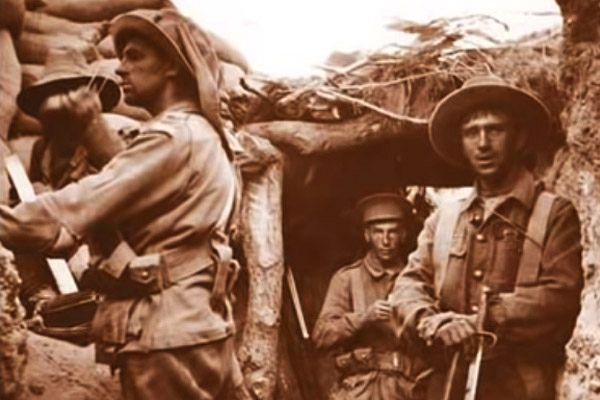Not all Australians reflect on Anzac Day the same way, with some seeing the day as a celebration of the horrors of war, writes Davey Heller.
ANZAC DAY, 25 April, came again with Australians being asked to stand together and declare “lest we forget”. Every year though, during the avalanche of militaristic imagery and words that marks this “celebration”, I reflect how it hasn’t always been like this in Australia. During my lifetime, I have watched Anzac Day being changed from a fading historical relic to a day elevated to a virtual State religion, central to the mythic narrative of Australian nationalism.
This change is personified by my experiences singing in primary school as a ten-year-old. Once a week, the highlight of my school week was joining the class “Let’s sing” session. The old radio would be turned on at the front of the class, we would take out our colourful songbooks and belt out an eclectic mix of songs together. In 1983, the songbook contained a song that left a deep impression on me — Eric Bogle’s The Band Played Waltzing Matilda.
The song is a haunting ballad of the journey of a young Australian man heading off to Gallipoli, cheered off by excited crowds, only to experience the hell of war and return maimed physically and emotionally. Written in 1971 at the height of the anti-Vietnam war movement, it strikes a powerful blow against war and the false “celebrations” of Anzac Day that are meant to sanctify this horror.
The song certainly left a powerful impression on me and I am always struck by the fact it is pretty much my only memory of engaging with Anzac Day from primary school. The ’80s were a time when the “Vietnam Syndrome” still hung in the air. This “syndrome” is the ruling class's term for the lingering anti-war sentiment that existed in the mass of the working class after that murderous war. They knew something had to be done and they got to work.
Since the Hawke Labor Government of the 1980s, literally millions have been spent in Australia on constructing a virtual State religion around Anzac Day. Bob Hawke was the first Prime Minister to make the “pilgrimage” to Turkey on Anzac Day in 1990. Since then, we have had endless speeches, parades, expanded war memorials, documentaries and books.
The education system has been flooded with “educational materials” to teach this curriculum including picture books about animals who “fought” for Australia for pre-schoolers. Even when I was teaching history over ten years ago, I would surreptitiously throw out the glossy pamphlets and DVDs I was sent each year but now I believe teachers are forced to teach this curriculum.
Australian culture is now saturated annually with militaristic imagery on Anzac Day. Even this year, under conditions of the pandemic, we are being encouraged to mark Anzac Day by lighting candles in our driveway at dawn. Whilst for ordinary people, the phrase “lest we forget” may contain some confusing anti-war sentiments, the ruling class knows full well the purpose of cultivating this “celebration”.
The ruling class has been working for decades to try and ensure that the next generation will be ready when called upon to “make the ultimate sacrifice” in U.S. imperialism’s next bloodbath which might be another World War, this time with China and Russia. For the ruling class, the phrase “lest we forget” is not a phrase to mourn the death of soldiers past but to lay the groundwork for murdering more young people in the meat grinder of imperialist war.
How dated the following lines now seem from Eric Bogle’s classic:
And now every April I sit on my porch,
And I watch the parade pass before me.
I see my old comrades, how proudly they march,
Reliving the dreams of past glory.
I see the old men, all twisted and torn,
The forgotten heroes of a forgotten war.
And the young people ask me, “what are they
Marching for?”
And I ask myself the same question.
And the band plays Waltzing Matilda,
And the old men still answer to the call.
But year after year their numbers get fewer,
Someday no one will march there at all.
However, I remain grateful for being exposed to the truths of this song and the anti-imperialist and anti-war seeds it planted in my mind. One day, when the working class has overthrown capitalism and humanity has thrown off the shackles of mindless nationalism, we can again look back at Anzac Day as a ritual from another time, a time when young people were forced to fight for “God and Country” and died in the mud. A time when trillions were wasted on war instead of fighting disease and hunger.
So I will mark Anzac Day this year by once again listening to the Pogues’ haunting version of The Band Played Waltzing Matilda and look forward to a future 25 April when no one will march there at all.
Davey Heller is a writer and campaigner. You can follow him on @socialist_davey.
 This work is licensed under a Creative Commons Attribution-NonCommercial-NoDerivs 3.0 Australia License
This work is licensed under a Creative Commons Attribution-NonCommercial-NoDerivs 3.0 Australia License
Support independent journalism Subscribe to IA.












